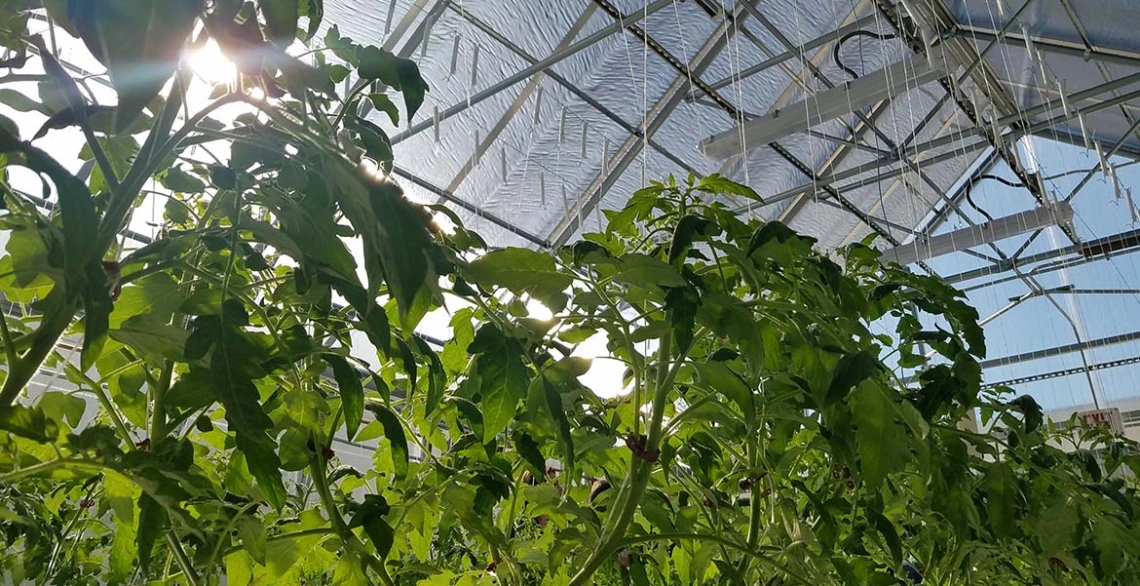NSF Grant Supports Engineering and Health Lessons for Pascua Yaqui and Hispanic Students
Students in the C2SHIP program are learning community advocacy and STEM concepts.

The Pascua Yaqui tribe employs a greenhouse for growing vegetables, such as salad greens, with little water. Nutrition is one aspect of the C2SHIP program.
A person’s proximity to a hospital has a direct impact on their quality of health, but health care systems are much more than a single building. University of Arizona faculty are training new high school graduates and Pima Community College students from the Pascua Yaqui tribe and the Hispanic community. They’re learning to become future engineers and alleviate health care shortcomings on reservations and other underserved communities with the help of a National Science Foundation grant.
The 10-week online course is part of Center to Stream Healthcare in Place (C2SHIP), a national consortium which aims to bridge the gap between early academic research and commercial readiness in order to accelerate “decentralized health care.”
“These students will be the future advocates for healthy living and well-being in the community,” said Professor of Electrical and Computer Engineering Janet Roveda, director of the UA’s C2SHIP site. “Like any other community in Arizona, the Pascua Yaqui tribe also faces chronic diseases like diabetes and cardiovascular diseases. Part of the problem is that people at the reservation depart from their traditional healthy food.”
A two-year, $220,000 supplemental NSF grant is supporting the tuition-free program. The Pascua Yaqui and Hispanic students are using Precision Health Institute, an online digital health program, for part of their education. The students are learning basics in public health, digital health, wearable technology and machine learning for biomedical data. Each lesson also integrates the traditional Pascua Yaqui health paradigm, which views medicine holistically.
Moving away from hospitals, decentralized "care in place" health care includes mobile care service, telemedicine, home visits, wellness programs, and use of Internet of Things technology. Along with this decentralized model, C2SHIP aims to increase access to personalized health care through infrastructure, services, community engagement and workforce development.
C2SHIP’s UA site received the grant in February 2023. The course, which includes one hour-and-a-half session each week, will end before the start of the academic school year. This allows for a natural pipeline for students to continue their STEM education.
From the start of the program, Roveda has worked closely with the Pascua Yaqui tribal officials, health and education department staff, meeting parents and students in the community.
“It is a beautiful community. We want to provide well-trained future experts to this nice community,” Roveda said. “The students I met there are brilliant and talented. I do not doubt that they will be our new students at UA.”
The collaboration began when Roveda was introduced to former Pima Community College Board member and Pascua Yaqui tribal mentor Luis Gonzales. Longtime tribal business leaders, the Gonzales family is aiming to support the tribe beyond their establishment of Casino Del Sol.
“Mr. Gonzales believes that new generations in the Pascua Yaqui tribe and Hispanic community will be Ph.D.s and MDs in the STEM field to make the communities his tribe the center of innovations,” Roveda said. “I followed Mr. Gonzales' vision and applied to the NSF START program under the C2SHIP center.”
Roveda and Gonzales, along with director of the Translational Health Science Research Program Shu Fen Wung, aim to support Pascua Yaqui and Hispanic students to succeed in the STEM field and become engineers and doctors.
“I learned a lot about the Pascua Yaqui tribe's arts, long history, and rich culture. They have developed a long list of highly nutritious food from desert plants that do not require much water to grow. These plants are the solution to chronic health problems,” Roveda said.
Roveda and Gonzales hope that these STEM and health care lessons, when combined with the Pascua Yaqui’s existing greenhouse, hospital, and body of knowledge, will lead to a brighter future for the tribe.
C2SHIP is an NSF Engineering Research Center led by UA in partnership with Baylor College of Medicine, University of Southern California and Caltech. UA faculty working to lead C2SHIP include Roveda, Associate Dean of Faculty Affairs and Inclusion Kathleen Melde, professor Hao Xin, and research assistant professors Ao Li and Chang-Chun (Max) Chen.

